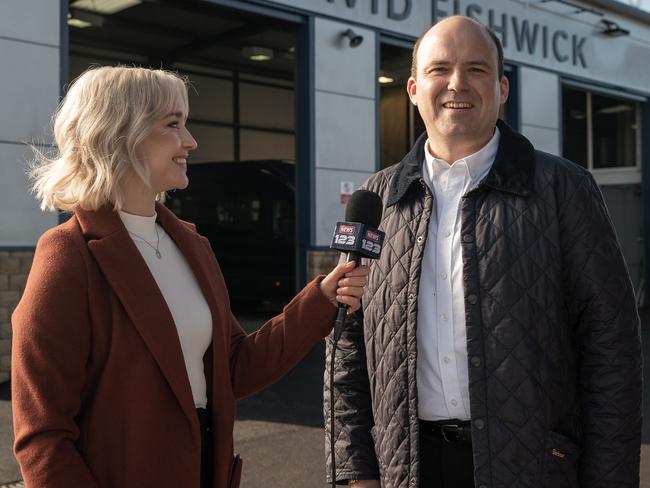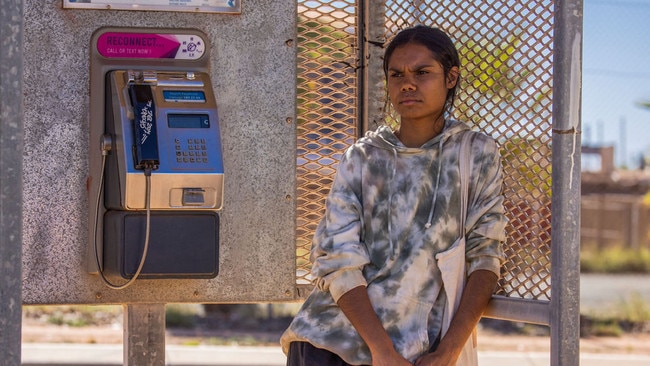Bank of Dave: a feel-good tale of underdog taking on the big guys
Bank of Dave’s GFC-era corner store loan business doesn’t seem like a promising subject for a movie, but the resulting film is a disarming, likeable affair.

Bank of Dave (M)
In cinemas
★★★½
There’s been a trend in British cinema lately to produce feel-good movies about underdogs who triumph against the odds.
Films like The Duke (2020) are loosely based on true stories and feature talented character actors in leading roles. The latest in this series of likeable but rather undemanding films is Bank of Dave which, the opening credits inform us, is “inspired by a true-ish story”.
This tall tale is set in Burnley, Lancashire, population abut 80,000. Here Dave Fishwick (Rory Kinnear, excellent) is a popular retailer of vans and mini-buses. He sings karaoke in the town’s most popular pub, is happily married, and loves to help people. He’s a thoroughly good bloke and Kinnear plays him to perfection.
The film kicks off in 2008 during the aftermath of the global financial crisis. Dave has been lending money to friends and customers in need, and he gets the idea of starting his own “corner store” bank to legitimise his loans. This doesn’t seem like a promising subject for a movie, but the resulting film is a disarming, likeable affair.
Dave quickly discovers that the London-based banking establishment – the Financial Review Committee, or FRB – is not inclined to register a new bank; they haven’t approved one for 150 years.
A stuffy London lawyer, Hugh (Joel Fry), who seems to think that anywhere north of the Home Counties is foreign territory, reluctantly heads north to act as Dave’s legal adviser. Hugh soon discovers not only that Dave is a lovely bloke but that the Burnley locals are kind, welcoming and thoughtful. He’s also charmed by Dave’s niece Alexandra (Phoebe Dynevor), a doctor.
The FRB, which is headed by patronising Sir Charles Denby (Hugh Bonneville in fine form), is made up of establishment bankers steadfastly opposed to an outsider starting a new bank. These Eton-educated types aren’t above playing dirty to maintain the status quo, including using Henrietta (Naomi Battrick), a discarded girlfriend of Hugh, who obtains information that one of Dave’s loans – to a friend for her husband’s funeral – was illegal. As a result poor Dave is brought before the Burnley Magistrates Court – a very good scene in which Hugh succeeds in turning the tables.
The end credits, which feature a photograph of the real Dave, state that the Bank of Dave is operating well and has loaned £30 million ($57m) with the profits donated to charities.
The film, directed by Chris Foggin, may stretch the truth but it has charm to spare and at a time when the big banks aren’t very popular, it’s sure to bring a smile to the face of many a borrower.
Sweet As (M)
In cinemas
★★★
Sweet As is a rather slight road trip movie about a program for troubled kids that involves taking photographs under the direction of a couple of adults.
Murra (Shantae Barnes-Cowan, good), is 15 and lives in Port Hedland with her mother, Grace (Ngaire Pigram), who is struggling with addiction.
When one night during a party hosted by her mother a man tries to come into her room, Murra appeals to her uncle, Ian (Mark Coles Smith), a cop, and he uses his influence to get her into the road trip program along with three other troubled kids: Elvis (Pedrea Jackson) who is Aboriginal, Kylie (Mikayla Levy) and Sean (Andrew Wallace), who are white. The group leaders are Mitch (Tasma Walton) and Fernando (Carlos Santos Jr.).
Most of the film, beautifully shot by Katie Milwright, involves the trip – the photographs taken, every one telling a story, the quarrels and minor dramas. The dramatic highlight occurs when the troubled Sean disappears.
There’s not a lot to a tale that is based on the personal experiences of director Jub Clerc but while the film is dramatically thin it’s visually strong.
The production of indigenous cinema in Australia seems to be very healthy at present, and though modest, Sweet As is an attractive and at times thought-provoking example of the genre.

We Were Once Kids (MA15+)
In cinemas
★★★½
Kids (1994), one of the most controversial films of the 90s, premiered at the Sundance Film Festival in January, 1995, and four months later screened in competition at Cannes in a version modified from its more explicit Sundance cut.
Directed by 52-year-old Larry Clark and scripted by 19-year-old Harmony Korine, the film depicted a 24-hour period in the lives of New York street kids whose main interests were sex, drugs and skateboarding.
The film was distributed and heavily promoted by Harvey Weinstein’s Miramax company.
I wrote at the time that “the use of young actors, some of them very young, in quite graphic sex scenes is troubling and leaves the filmmakers open to challenges of exploitation … though the filmmakers claim that all the actors were 18 the evidence points to the contrary.”
The film was a success. [Gene] Siskel and [Roger] Ebert, America’s top TV critics at the time, gave it Two Thumbs Up, but the only one of the young actors able to enjoy a successful subsequent career was Chloe Sevigny, who in Kids plays an HIV-positive girl who is raped.
We Were Once Kids is a new Australian documentary that takes a fresh look at Clark’s film, accessing behind-the-scenes footage and archived home movies as well as contemporary interviews.
Director Eddie Martin explores the world in which the kids in the film were living – and it’s a pretty distressing environment.
Interviewees explain how they went to casting calls and Justin Pierce and Harold Hunter emerged as the “stars”. During filming Clark allegedly encouraged the sex and drug taking.
One of Martin’s most interesting discoveries is footage of the original Cannes press conference, attended by Clark and Korine (none of the kids, who were each paid $1000 for their “acting” in the film, was taken to France). Many journalists are openly hostile and Clark becomes visibly angry and defensive.
The film made a huge profit for Clark and Weinstein. Later Pierce went to Hollywood to try his luck as an actor, with little success, while Hunter died of a cocaine overdose.
So what’s the Australian connection? Why is this very sad, very American story the basis for an excellent Australian documentary?
That will be revealed at the end of the film, and it comes as a complete surprise. The film is grimly revealing as to the ways in which Clark – who refused to be interviewed by Martin – apparently exploited his youthful actors.


To join the conversation, please log in. Don't have an account? Register
Join the conversation, you are commenting as Logout